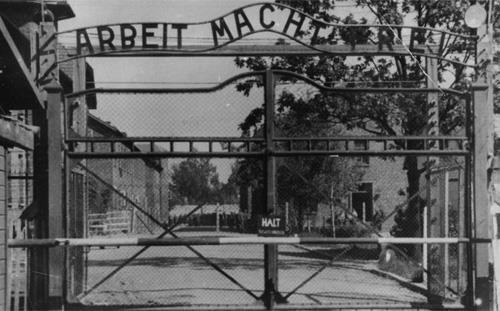
The PBS series Secrets of the Dead, to be honest, sometimes feels a little too commercial. It asks provocative historical questions, then at times explores them with a little too much ominous music and a few too many melodramatic re-creations.
This week, however, it’s right on target with a show that asks and calmly explores one of the toughest moral questions of humanity’s last century.
Once the Allied forces in World War II knew the full extent of the genocide at Nazi extermination camps, should the Allies have tried to destroy those camps, even though tens of thousands of prisoners were still held in them?
Secrets of the Dead: Bombing Auschwitz, which premieres Tuesday at 9 p.m. ET (check local listings), doesn’t answer the question. Instead, it does something equally important and deeply journalistic: It presents the arguments that those on both sides had to weigh over several critical months in mid- to late-1944.
The Allies had long known about the camps, including Auschwitz. But while some say their purpose was always clear, it wasn’t until April 1944 that two prisoners escaped and fully detailed the scope and logistics of the extermination program.
Jewish groups, as well as some refugee groups, immediately called for the Allies to bomb the camps and shut down the killing machinery. It was deemed particularly urgent because the escapees reported that in late April 1944, the Germans were about to start bringing in and killing 800,000 Hungarian Jews.
The primary moral argument against the bombing was that it would also kill prisoners, who numbered up to 30,000.
The first higher official to receive the escapees’ detailed reports was American John Pehle at the War Refugee Board in Switzerland. Pehle agreed that bombing the camps would, in the end, save lives – as well as make the right statement about how the world regarded the Nazi program.
Higher-ups in the U.S. government rejected the idea, fearing that the Germans might use it for propaganda about the morality of the Allies or, alternately, might respond by doing something even worse.
One of the historians in Secrets of the Dead dryly asks, “What could be worse than Auschwitz?”
Winston Churchill and Britain at first favored the bombing then backed off – less on moral than tactical grounds.
In late April 1944, the Allies were preparing for D-Day, the European invasion they correctly felt would end the war. Focusing all energy on that campaign, they felt, would be the best way to end the killing.
Some military commanders favored the bombing. Others argued it would be impractical. While the goal would be to blow up the crematoria where the killings took place, the imprecision of World War II bombs made it likely that pilots would have to drop thousands of bombs to have a decent chance of hitting the crematoria, while many of the rest would likely kill prisoners.
Inadvertently illustrating that concern, Auschwitz actually did get bombed one day in September by planes aiming at a factory four miles away.
There was also a push to bomb the rail lines bringing prisoners into Auschwitz. That idea, too, was never implemented and is mentioned only incidentally in Secrets of the Dead.
Whatever the reasons, Auschwitz, and its sister facility Birkenau, remained operational from April 1944, when the incontrovertible evidence emerged, until late November, when a frustrated Pehle leaked the documentation to the press, and the Nazis began attempting to dismantle the evidence of their genocide.
In June 1944, 109 trains brought Hungarian Jews to Auschwitz, with an average of 2,975 persons on each train. Those who survived the three-day train trip, packed into cattle cars, were almost all killed, more than 5,000 per day.
In January 1945, a little more than eight months after the truth escaped, the Soviet Army liberated Auschwitz.
Secrets of the Dead touches briefly on the human side of the Holocaust, noting that most of the people who arrived at Auschwitz had no idea what awaited them there.
As they were herded off the train, they were sent either left or right. To the left went most women, children, elderly, and infirm. They were considered useless as workers and therefore of no value. To the right went maybe 5%-10% of the prisoners, men who looked able-bodied and could be pressed into labor.
It’s hard to watch this Secrets of the Dead and not hope that in the next life, those who created Auschwitz and the other death camps might face a parallel reckoning.
This show, however, has the narrower focus of detailing exactly when the truth about Auschwitz was proven beyond doubt, what it meant in moral and tactical terms, and how the rest of the world reacted to an atrocity it was now impossible to ignore.
Producer/director Tim Dunn and writer Mark Hayhurst carry out their mission admirably – right down to tacitly acknowledging that this is a story where no one wins.